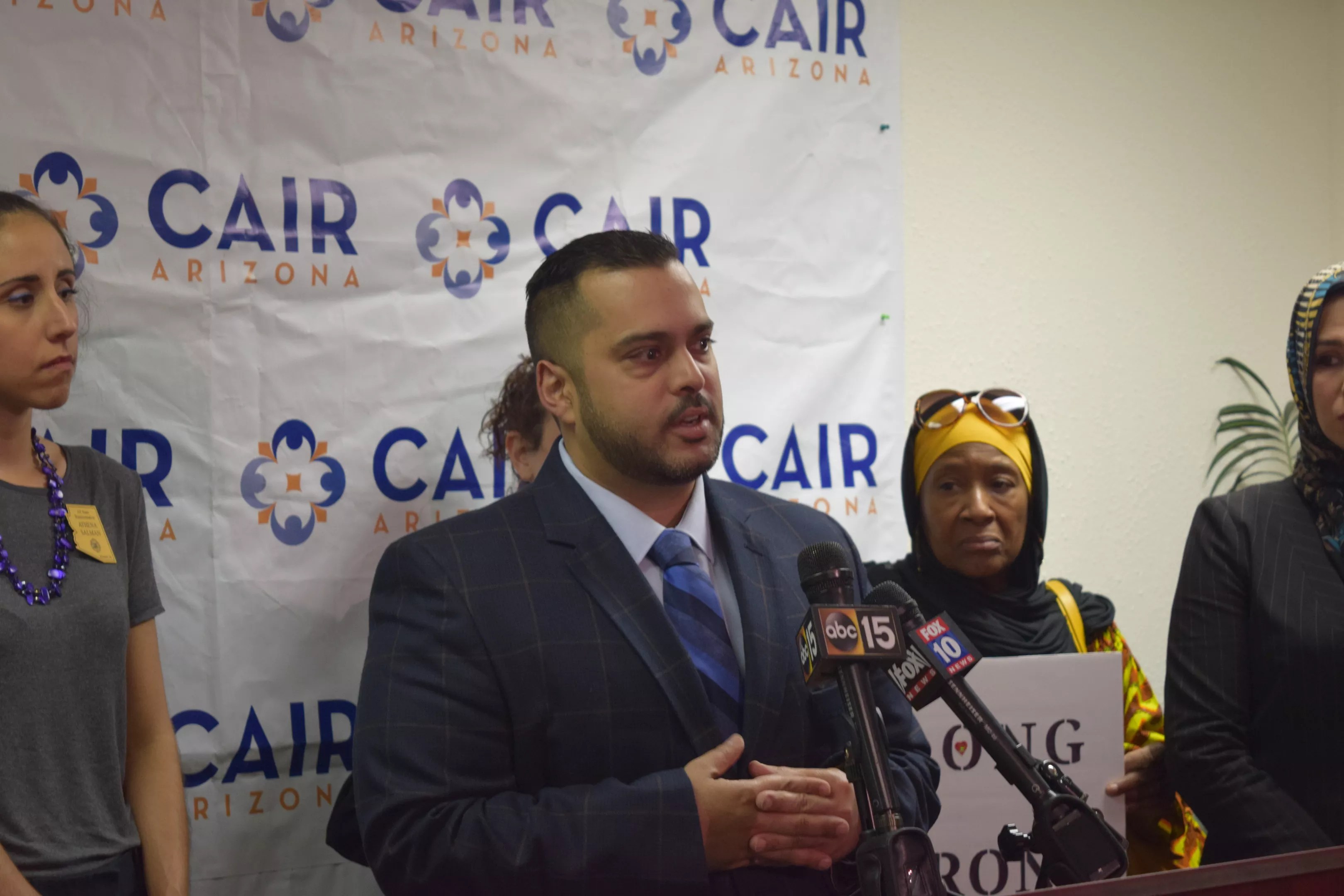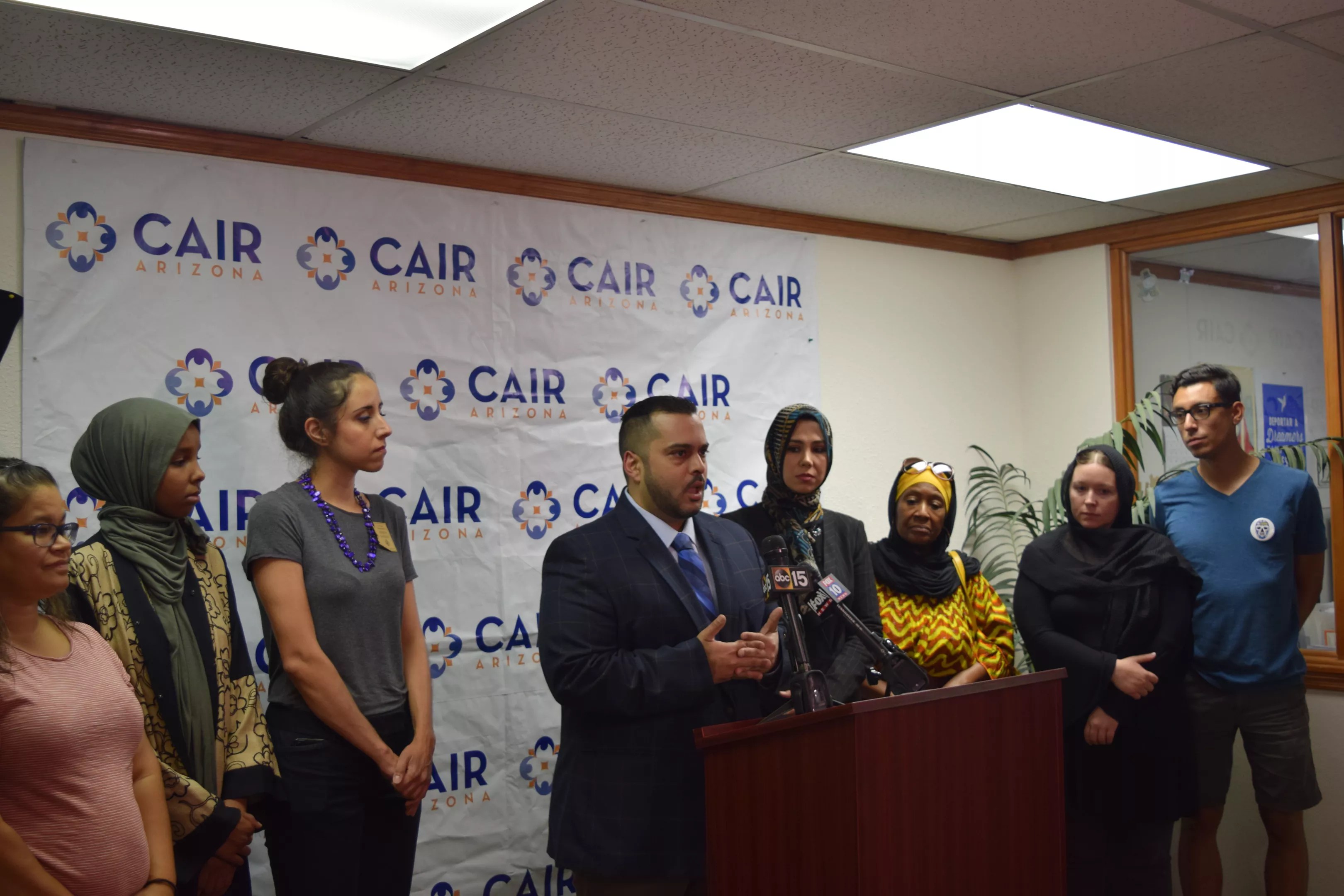
Joseph Flaherty

Audio By Carbonatix
Arizona activists condemned the Supreme Court’s decision on Tuesday to uphold President Trump’s travel ban on several Muslim-majority nations.
Imraan Siddiqi, the Arizona director for the Council on American-Islamic Relations, drew a line between the travel ban ruling and disastrous Supreme Court decisions of the past. The fact that the nation’s high court has made a ruling doesn’t mean that ruling is moral or just, he argued.
“This is obviously a disappointing development for us – not only to the Muslim community, but for minorities, and the entire country as well,” Siddiqi told reporters at the CAIR office in Mesa on Tuesday.
Siddiqi referred to shameful Supreme Court decisions affirming racism and discrimination: Korematsu, which upheld the internment of Japanese-Americans during World War II, and Dred Scott, which expanded slavery and denied citizenship to African-Americans nationwide.
He said that lawyers and activists will continue to fight to overturn the ban via the lower courts.
At issue in the case was whether Trump’s repeated denigration of Muslims meant that the ban was a discriminatory measure targeting a religious group.
In December 2015, then-candidate Trump called for “a total and complete shutdown of Muslims entering the United States until our country’s representatives can figure out what the hell is going on.”
Siddiqi said this campaign promise led directly to the announcement of Trump’s executive order during the first month of his presidency, which inspired massive protests at airports.
“You see a linear line being drawn from that to a bunch of other bigoted statements, including ‘Islam hates us’ [and] ‘We have a Muslim problem,’ Siddiqi said. “This is a continual set of bigoted statements toward the Muslim community.”
Civil rights groups immediately filed suit against the first iteration of the ban, arguing that it amounted to blatant discrimination based on religion and national origin. Several lower courts quickly blocked the executive order, but the administration revised the ban and reissued it as a new proclamation in an attempt to circumvent future legal challenges.
The latest iteration of the ban targeted Iran, Libya, Syria, Yemen, Somalia, Venezuela, and North Korea.
The Supreme Court decision pitted the five more conservative justices against the four liberal justices in the minority. Writing for the majority, Chief Justice John G. Roberts deferred to the president’s power to curtail immigration.
Opponents argued that the ban was driven by religious animus and discrimination, as shown by Trump’s statements about Muslims during the campaign. But Roberts said that the plaintiffs’ argument did not hold up because Trump’s proclamation is “facially neutral toward religion.”
“The President lawfully exercised that discretion based on his findings – following a worldwide, multi-agency review – that entry of the covered aliens would be detrimental to the national interest,” Roberts wrote.
SUPREME COURT UPHOLDS TRUMP TRAVEL BAN. Wow!
— Donald J. Trump (@realDonaldTrump) June 26, 2018
Justice Sonia Sotomayor was not convinced. In a searing dissent, she argued that the ban’s “repackaging” on national-security grounds “does little to cleanse Presidential Proclamation No. 9645 of the appearance of discrimination that the President’s words have created.”
“Based on the evidence in the record, a reasonable observer would conclude that the Proclamation was motivated by anti-Muslim animus,” Sotomayor wrote. Justice Ruth Bader Ginsburg joined her in the opinion.
State Representative Athena Salman, a Democrat who represents District 26 in Tempe, condemned the ruling at the CAIR event. The decision runs counter to America’s founding value of religious liberty, she said.
“We have a president who is disrespecting and undermining these values,” she told reporters. “And we have an entire party, the Republican Party, who are in lockstep to try and achieve this aim – first targeting the Muslim community, but let it be told, they will not stop here.”

Individuals denounce the decision to uphold Trump’s travel ban, including Rep. Athena Salman, third from the left.
Joseph Flaherty
José Patiño, the campaign director for Latino-advocacy group Aliento, said that the precedent of the travel ban decision is frightening. He argued that the decision could allow the president to issue blanket bans on any group of people from entering the country in the name of national security.
“For us, this is a dark day, and we will remember this forever,” Patiño said. “Just because the law is legal doesn’t make it just – doesn’t make it moral,” he added.
Because employees of CAIR-AZ and Aliento share office space in Mesa, Patiño said that they had anticipated this Supreme Court ruling for a long time.
The decision on the travel ban arrives as another crisis related to law and immigration is underway at the U.S.-Mexico border. Since last month, the Trump administration’s “zero-tolerance” policy has led to thousands of children being separated from their families as they await prosecution and deportation.
Patiño, a recipient of the Deferred Action for Childhood Arrivals program, said that they are also expecting the Supreme Court to rule on the Trump administration’s design to rescind DACA. The decision to end the program is currently on hold thanks to an appellate court ruling.
He got choked up as he described the stakes of the legal battles.
“All of our communities are being attacked,” Patiño said in an interview.